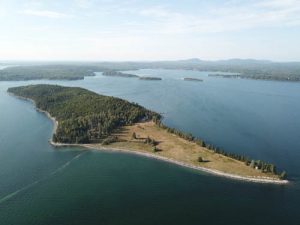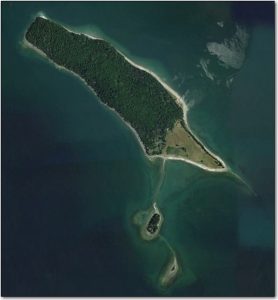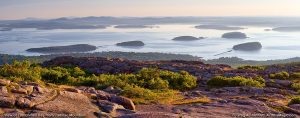 Calf Island is privately owned and has served as family vacation property for generations. Prior permission is required in order to visit. Since 2017 management of Calf is via a family-owned, Maine-registered company – Calf Island, LLC. Members of the managing LLC are solely responsible for the island’s current and future conservation. To help them succeed they rely heavily on the public’s good will, understanding and respect of private property.
Calf Island is privately owned and has served as family vacation property for generations. Prior permission is required in order to visit. Since 2017 management of Calf is via a family-owned, Maine-registered company – Calf Island, LLC. Members of the managing LLC are solely responsible for the island’s current and future conservation. To help them succeed they rely heavily on the public’s good will, understanding and respect of private property.
Calf Island is located immediately southeast of the Town of Sorrento, the main village of which lies on the southern end of Waukeag Neck in Hancock County, Maine. Calf Island itself is around 93 acres above the high tide line and although it has passed through many owners over the last 230 years, it has continuously remained in private hands since originally purchased by Joseph Bragdon of Sullivan in 1786 for the price of £17/4s. In the late 1700’s Maine was still part of the Commonwealth of Massachusetts and the Town of Sullivan included all of what is now known as Sorrento.
Starting in the 1830’s Nathaniel Stover, his wife Lydia and several of their children began homesteading out on Calf and in 1841 Lydia finally purchased the island from the prior owners for $770. The Stover family continued to work Calf as a subsistence farm until around the time of the Civil War. Calf’s title remained with the Stover’s until 1883 when land speculators entered the picture. These investor-owners included Walter S. Gurnee, ex-mayor of Chicago, and later his son Augustus Coe Gurnee, who sold his 100% consolidated interest in the island in 1910.
Between 1871-1878 while still under Stover ownership and with their permission, Prof. Charles W. Eliot, then president of Harvard University, camped on the island with his four children for portions of each summer (save one). From their base known as “Camp Sunshine” on Calf Island they explored the landscape of Acadia. Several decades later in 1916 Prof. Charles W. Eliot, George B. Dorr and John D. Rockefeller, Jr. were instrumental in founding Sieur de Monts National Monument on Mt. Desert Island which in 1929 expanded to officially become Acadia National Park, the first National Park east of the Mississippi. Although Calf has never been part of Acadia National Park, it is hard to argue that the summers spent there by the Eliot family in the 1870’s didn’t influence their desire to preserve the natural beauty of this unique part of Maine.
Immediately off the southeastern shore of Calf lie two additional smaller islands known as “Little Calf” and “Thrumbcap” that physically connect with Calf via sandbars exposed during low tide. These two, originally called “Burnt” and either “Block” or “Black”, were consolidated with Calf in 1912 by Colonel Edward de Veaux Morrell of Philadelphia who had become Calf Island’s sole owner the previous year. Col. Morrell and his wife Louise Drexel Morrell were prominent members of Bar Harbor’s vibrant “Gilded Age” summer community during the late 19th and early 20th century. After Col. Morrell’s death in 1917 Mrs. Morrell continued to spend part of her summers on Calf each year for nearly 3 decades. The Morrell’s stewardship of Calf spanned the time from immediately prior to WWI up to the middle of WWII. This covers both the Roaring ’20’s and the Great Depression.
These two, originally called “Burnt” and either “Block” or “Black”, were consolidated with Calf in 1912 by Colonel Edward de Veaux Morrell of Philadelphia who had become Calf Island’s sole owner the previous year. Col. Morrell and his wife Louise Drexel Morrell were prominent members of Bar Harbor’s vibrant “Gilded Age” summer community during the late 19th and early 20th century. After Col. Morrell’s death in 1917 Mrs. Morrell continued to spend part of her summers on Calf each year for nearly 3 decades. The Morrell’s stewardship of Calf spanned the time from immediately prior to WWI up to the middle of WWII. This covers both the Roaring ’20’s and the Great Depression.
Calf and its’ connected smaller islands were most recently acquired under a single consolidated title in early 1947 by a “rusticator” from Sorrento who feared desecration of the island by pulpers. This propitious acquisition from Mrs. Morrell’s estate 17 months after her passing took place a mere 6 1/2 months prior to the Great Bar Harbor Fire which destroyed 67 majestic summer estates, 5 grand historic hotels and over 10,000 acres inside Acadia National Park.
Calf, Little Calf and Thrumbcap are just a few of the numerous islands located in Frenchman Bay that help provide part of the dramatic vista looking north from the top of Mt. Cadillac for millions of visitors to Acadia National Park each year.

However, unlike several other islands in northern Frenchman Bay, Calf Island IS NOT part of Acadia National Park NOR does it belong to any Public Land Trust or Nature Conservancy group. To this day this picturesque undivided three island group totaling 160 acres more-or-less (which as per Maine Law includes all beaches and connecting sandbars down to the low tide line) is still privately owned, preserved and protected by the descendants the alert cottager who acquired it more than seventy-five years ago.